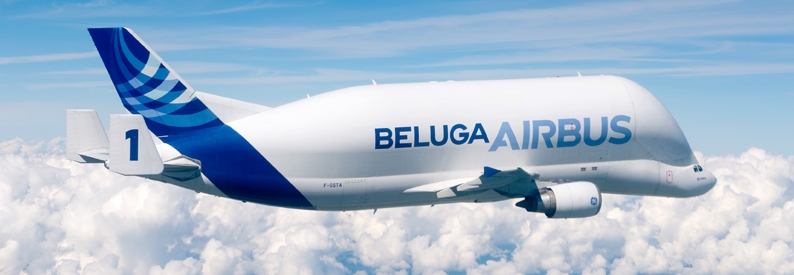Airbus to proffer Belugas to commercial cargo market
Airbus (AIB, Toulouse Blagnac) has announced that it has begun operating commercial cargo services with its fleet of A300-600ST Belugas. By the end of 2023, the manufacturer will obtain a separate Air Operator's Certificate (AOC) for these operations.
Until now, the Belugas have operated almost exclusively for Airbus, transporting large aircraft parts such as fuselages and wings between the manufacturer's sites, only very occasionally transporting third-party cargo.
The manufacturer said that its first commercial Beluga flight took place in late December 2021, when F-GSTC (msn 765) delivered a Airbus Helicopters airframe from Toulouse Blagnac to Kobe (via Warsaw Chopin, Novosibirsk, and Seoul Incheon). In 2022, two Belugas will be earmarked exclusively for commercial cargo services, with the remaining three due to transition to commercial service in 2023. Until the new cargo unit obtains its own AOC, flights will continue to be operated by Airbus Transport International (4Y, Toulouse Blagnac), Airbus's in-house outsized cargo transportation subsidiary.
"Whereas the ATI structure is inherently focused around the European network of Airbus plants, the new airline, which we will create, will be flexible and agile to address the needs of external markets. Moreover, it will have a worldwide scope and we will be organised for that around the globe," said Phillippe Sabo, the head of ATI Air Oversize Transport.
The Belugas' entry into commercial service follows a decision to replace them with new-generation A330-700ST BelugaXLs. ATI has thus far inducted three of the new aircraft but is due to increase the fleet to six by 2023, when the previous generation freighters will become redundant.
Airbus stressed that despite their planned retirement from in-house operations, the Belugas "still have plenty of available flight-hours remaining before reaching their original design service limits". The aircraft are being replaced mostly due to higher capacity needs associated with the ramp-up in A350 Family production.
While much more limited in terms of payload compared to other outsized freighters, such as the An-124, the An-225, the B747-400(LCF), or the Il-76, the Beluga offers the world's largest cabin cross-section, allowing for the transportation of outsized freight without the need for dismantling. Airbus said this could be particularly attractive to the space, aerospace, and construction industries.



No comments:
Post a Comment